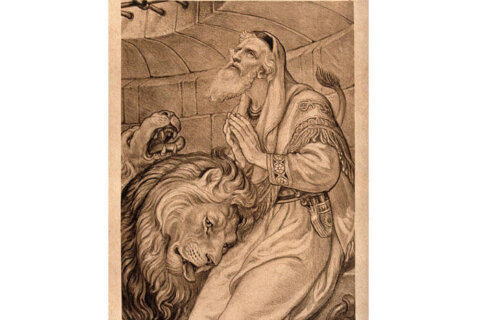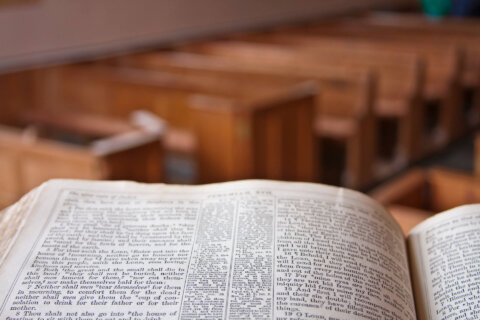DANIEL SIDNEY WARNER was, arguably, more than a century ahead of his time with regard to civil rights. He was born in what has been prophetically alluded to as a “whirlwind” the country at odds with itself factions vying for moral and spiritual justification to support their own position on the issue of slavery. Prior to our enlightenment on the construct of “whiteness,” prior to Martin Luther King Jr, the Ku Klux Klan, race riots, bus boycotts, and the Civil War, Warner’s mind and spirit were forged in a young nation full of hatred, violence and division. He was both a visionary and an activist.
Though historical accounts lack detail, certain life events affirm that he was zealous for justice and righteousness even prior to his salvation. After his brother was drafted, Warner volunteered to serve in his place in the Union Army, since, unlike his brother, he had no family to leave behind. After the war, he enrolled in Ohio’s Oberlin College which, in addition to its reputation as one of America’s most fiercely abolitionist colleges, was also the first to admit women and was one of the first two to admit African Americans.
Having experienced salvation in the year 1865, Warner’s subsequent direction tells of a zealous Christian, prioritizing the principal of Christian unity, as exemplified in the following journal entry:
Now we wish to announce to all that we wish to cooperate with all Christians, as such, in saving souls-but forever withdraw from all organisms that uphold and endorse sects and denominations in the body of Christ.
This message distinguished Bro. Warner and the Church of God reformation from all other movements of the time. It was a herald, a distinction, and a hallmark signaling the movement’s divinity and its superseding wisdom and beauty in an ugly and divisive period of American history.
Warner went on to spearhead the reformation of the church through his trifold biblical understanding of salvation from sin, baptism of the Holy Ghost, and anti-denominationalism.
While other movements had based their creeds in doctrines such as salvation by faith (Protestantism), sin-free living (holiness movements) and sanctification (Moravians, Wesleyans, and later holiness movements), Warner was the first to unite these teachings with Christ’s prayer that all His children dwell together in perfect love. Enlivened with the vision of a cleansed and glowing body of believers, D.S. Warner, irrepressibly, lived, taught, and preached the full gospel message- that Christ’s miraculous work of sanctifying His people necessarily results in an unprejudiced love of all of His children- to post-Civil War America a place that was all at once both deeply ready for, and furiously resistant to such a report.
At the inception of Bro. Warner’s ministry, the Civil War had been over for approximately 16 years. His message of unity and equality naturally had particular resonance with former slaves born under oppression and cruelty, and therefore contributed to the movement’s rapid prosperity and growth in diversity. In his book The Quest for Unity and Holiness, page 162, John W.V. Smith wrote:
“Many church groups avoided making a strong interracial stance. The Church of God reformation’s message of unity of all believers, however, made a very strong interracial position inherent to the message itself. It is notable, how- ever, that in the first decade, no special point was made of the racial issue; the message was preached and black people responded and were accepted.”
And yet, while the news that full salvation is manifest as equality and unity of the brethren was a logical concept that should have continued to enjoy free reign in the hearts of Christians, Warner’s teachings faced opposition (most notably in southern states but also in the North) from manifold religious hypocrites unwilling to surrender their societally granted and self-perceived superiority.
However, at its pinnacle, the Church of God was among the fastest growing Christian movements in the world. In a country ripe for revolution and resurrection, Bro. Warner’s passionate and timely preaching of eternal truths penetrated the hearts of many and succeeded at gathering thousands to the church’s annual camp meetings. John W.V. Smith wrote:
“Both blacks and whites sought to make the ideal of unity a reality, and their dedication to this is evidenced by the many meetings which were held throughout the South with both black and white people not only present, but actually worshiping together as equals! This open racial integration in worship services showed the commitment of the participants to the unity concept, for these interracial meetings were held in defiance of the prevailing customs and laws throughout the South which prohibited such integrative practices.” (Page 164)
In another example, James Earl Massey, in his book African Americans and the Church of God, quotes a leaflet advertising a 1902 camp meeting in Payne, Ohio (a meeting begun by Brothers Warner and A.J. Kilpatrick in 1895), as stating:
“We are decidedly negative on the race question, known in the South as the ‘Color Line,’ and we invite the people of every race to be free to come to this meeting. There will be no distinction made in privileges or charities.”
Such examples and other records are evidence that, during Warner’s time, the church defiantly preached the power of sanctification to cause Christians to be indiscriminately united in love. Still, the opposition Warner met was from both without and within the church. Many so-called “whites” within the movement vocalized their objection to the meeting together of the so-called “races,” and their wishes for separate meetings and exemptions from the ordinance of the holy kiss. Warner stood mightily against such hostility at the risk of his own life and position.
With national camp meetings and their headquarters later located in Anderson, Indiana (a hotbed of racism and Ku Klux Klan activity at that time), threats of violence directed at the church were real. And while Warner lived, camp meetings were integrated, glorious, and diverse, with reports of African American attendance accounting for as much as one third of the total.
With an attendance percentage more than double the rate of African Americans in the American population, and within a global system that despised equality, the devil took opportunity to work division in a Church of God movement that could otherwise have been a fulfillment of Isa- iah 2:2-4.
As time progressed, racial tensions continued to rise. While Bro. Warner lived, judgment prevented racial hostility and the spirit of white supremacy from taking full effect within the church. As the leader of this resistance, it is not unlikely that the effort and strain of such constant friction contributed to Warner’s death in 1895, when he was only 53 years old.
Within two years of Warner’s death, the editor of the Gospel Trumpet, E.E. Byrum, wrote an apparently conflicting article in the Gospel Trumpet instructing the church to both “obey God rather than man” and to “follow the customs of the country (the government) though they differ from those of our native place (the church),” further delineating that “white and colored people” should not “mix in marriage,” that it would be better for black people to “meet in separate meetings” and that the “white brethren” were “not require(d)” to greet the “black brethren” with the holy kiss.
While his letter ambiguously addressed the legal and customary concerns being raised primarily by congregants in the South, Byrum not only missed his opportunity to take a firm stand against racial inequality, but also gave unrequited permission for the movement to both fold under governmental pressure and to continue in their misconception of the supremacy of the “white race.” The long-term effect was even more devastating.
Nicholas Stanton-Roark, archivist of Anderson University, declared that, “Numerous sources indicate that the clan was pressuring the leadership at Anderson,” since many black people were coming into Anderson for the camp meeting. The hands of that racist organization were evident in Indiana politics and society. A pivotal incident that occurred at the 1912 camp meeting eventually culminated in the permanent separation of saints into “white” and “black” congrega-tions. Smith reports that:
“Several white leaders suggested to blacks that they might find it more desirable if they found some other place to worship. Their presence in such large numbers, it was felt, was hindering many white people from coming to the meetings and being saved. The confrontation set the climate for the beginning of a separate organization among blacks in the Church of God” (Massey, page 88). Whether it was truly out of a burden for the souls of racist white folk, or as Massey speculates, “a concern to see the church work maintain local recognition in the community and secure its financial footing”, the leadership’s willingness to sacrifice united worship was a clear act of forsaking previously held spiritual understanding in order to worship the god of white supremacy.
If ever there was a compromise significant and deceptive enough to cause the silence, apostasy, and division of such a mighty and anointed work of God as the Church of God Reformation in the sixth trumpet time, white supremacy rooted in the fear and hatred of our brother, would be it.
While we have lamented the spiritual compromise and division in the Church of God that took place between the years 1910 and 1913, acknowledging that the surviving ministry of the church forsook doctrines and standards in their desire to win “the better class”, we are only now coming to a full understanding of the deep-rooted cause of such a transgression. To discard the commandment to love one another as Christ loved us (John 13:34; John 15:12), to refuse to be made perfect in one (John 17:23), and to forsake the assembling of ourselves together (Hebrews 10:25), are actions that Christ’s words suggest would prevent the world from believing the gospel. As we wait for the answer to Christ’s prayer in John 17 and the prophecy that all nations would flow unto the church to begin to take form in our time, let us understand that we will not see the fulfillment of God’s will for His people without a reconciliation of the sins of the past.





